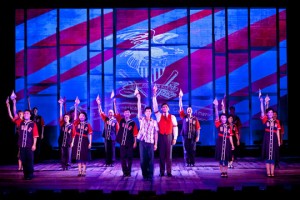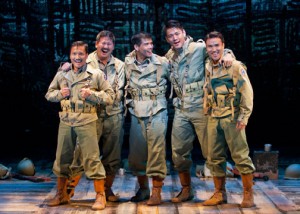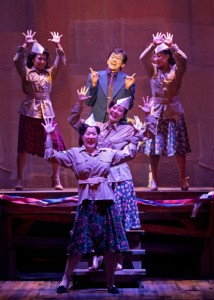NEW MUSICAL TOO LUKEWARM
TO PLEDGE ALLEGIANCE TO IT
Following the Japanese attack on Pearl Harbor, FDR issued Executive Order 9066, authorizing “exclusion zones” which effectively allowed for the forced evacuation of persons of Japanese ancestry in California, Washington and Oregon. Two-thirds of the 120,000 internees were American citizens, and since it was indiscernible as to who may be a spy, they were forced to sell or abandon their property and belongings, and relocate to barbed-wire compounds in remote areas of the Western United States.
Allegiance, a world premiere musical at the Old Globe, misses its opportunity to take us on a sweeping, sobering, and redemptive journey through a national shame: The internment of Japanese-American citizens into camps during World War II. With book by Marc Acito, Lorenzo Thione, and Jay Kuo, and music and lyrics by Kuo, Allegiance captures the essence of conflicting loyalties during an event which is still too little known or understood to many Americans. However, tepid storytelling of a powerful event and colorless lyrics, which often repeat what we already know about the characters, keep an interesting tale from becoming a good musical.
The story centers on the Kimura family of Salinas: Patriarch Tatsuo (played with stoic vulnerability by Paul Nakauchi) had managed to keep his artichoke farm and raise two children through the Depression. His son Sammy (Telly Leung), a new generation of American who has just been elected class president, gleefully sings “Just wind me up ’cuz I’m going places.” Sammy’s older sister Kei (Lea Selonga) is 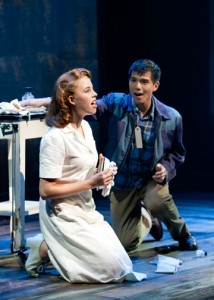 caught in transition between the traditional culture of her father and the limitless American future her brother fervently embraces. Their internment at Heart Mountain, Wyoming, becomes a seething cauldron of conflicting allegiances: to country, to family, to self.
caught in transition between the traditional culture of her father and the limitless American future her brother fervently embraces. Their internment at Heart Mountain, Wyoming, becomes a seething cauldron of conflicting allegiances: to country, to family, to self.
The Japanese American Citizens League was key in aiding the War Relocation Authority’s internment camp program. JACL National Secretary Mike Masaoka is played by Paolo Montalban with the unctuous resolve of a collaborator convinced the situation would be worse without him. Masaoka needs a Japanese face to help keep the internees in line, and Sammy accepts his offer to be the JACL liaison at Heart Mountain. Together, they hoof through “Better Americans,” a spirited take on assimilation and baseball. The song feels like a turning point from the rather tepid lyrical fare up to then, promising an edgier take on the issues surrounding their internment. But subsequent numbers feel reigned-in with flat, modular lyrics which usually fail to heighten emotion or define character.
Also, the songs are rarely used as revelatory moments to thread a complex narrative. When they do, the powerful storytelling that emerges is a glimmer of what this show is capable of: “Higher,” sister Kei’s reflection of childhood and family, is a terse metaphor for an underlying conflict—being driven by a dream and repressing the personal strength to achieve it. With powerful vocal clarity and girl-next-door sweetness, Selonga begins the song with the simplicity of a conversation over coffee; she sits in her spartan quarters, chair open, arm resting on table’s edge and calmly weaves a tale of siblings on a swing. When Kei sings, “The day she bent to 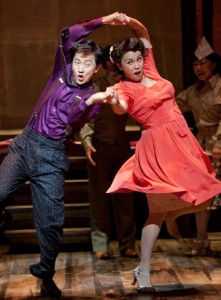 kiss her mama a last good-bye,” we are snapped back to a moment earlier in the play when Tatsuo’s coldness toward Sammy must have stemmed from his wife’s early death. As with “Higher,” what sells these songs is Lynne Shankel’s stunning orchestrations and a cast of vibrant vocalists who know how to project emotional intent.
kiss her mama a last good-bye,” we are snapped back to a moment earlier in the play when Tatsuo’s coldness toward Sammy must have stemmed from his wife’s early death. As with “Higher,” what sells these songs is Lynne Shankel’s stunning orchestrations and a cast of vibrant vocalists who know how to project emotional intent.
The musical may lack rigor, but director Stafford Arima has ensured that Allegiance has numerous brilliantly crafted moments. Especially effective is Donyale Werle’s set of giant shifting shoji screens, which serve as surfaces for Darrel Maloney’s evocative projections. Together, they not only transport the story from farm to camp to battle front in France, but provide the gateway for entering the play itself. In the initial scene, December 7, 2001, an elderly Sammy (a wistful George Takei) is given a box from his sister who has recently died. When he flips the lid open we see the top of the box imprinted with a colorful version of the dull projected wallpaper of his apartment. The wall lifts and we are drawn as if through the box into Sammy’s memory.
The visuals are memorable, but the musical is soon forgotten.
Allegiance
Donald and Darlene Shiley Stage
The Old Globe
Balboa Park in San Diego
ends on October 28, 2012
for tickets, call 619.234-5623
or visit The Old Globe

